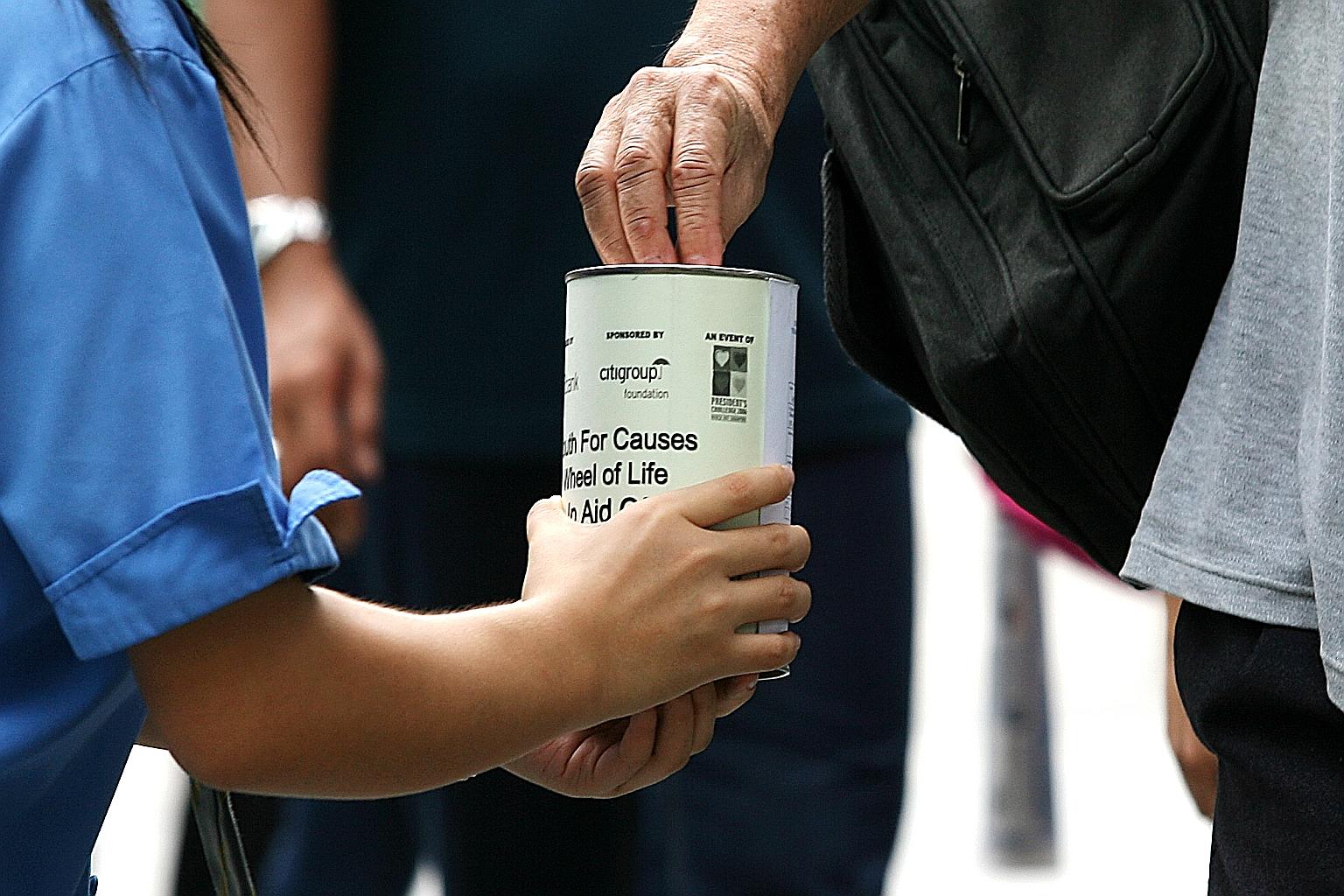Charity boom: Number of registered charities increase by 23% in 10 years
There are 2,215 charities here now helping wider causes and specialised groups, with 23% surge in a decade
Sign up now: Get ST's newsletters delivered to your inbox

With public confidence in charities improving in recent years, donations have been increasing. Tax-deductible donations to charities hit $1.1 billion last year, a more than 12 per cent increase from the year before, and the highest in at least 16 years.
BUSINESS TIMES FILE PHOTO
With more people taking an interest in meeting needs around them, the number of charities in Singapore has grown in recent years.
There are now 2,215 registered charities here, up from 1,807 a decade ago in 2005, according to the Office of the Commissioner of Charities (COC) which oversees charities.
This 23 per cent surge is comparable to the boom in public charities in the United States, which was recently named the world's second most charitable country after Myanmar in this year's World Giving Index.
Between 2002 and 2012, the number of public charities in the US grew 29.6 per cent.
The global survey tracks the percentage of people who donate or volunteer in each country.
In Singapore, people are venturing into a wider range of causes.
These can range from helping migrant workers (Migrant Workers' Assistance Fund) to supporting people living with Aids (Catholic Aids Response Effort) and calling for cleaner loos (Restroom Association).
A group has to fulfil various criteria, including legislative conditions and governing board requirements, to be a registered charity.
Niche charities with a highly specialised focus have also sprung up.
Out of the 51 organisations which registered as charities last year, for instance, there is one - Conjunct Consulting - that provides professional consulting services for other fledgling charities. There is also the Crohn's and Colitis Society of Singapore, which seeks to help those with inflammatory bowel diseases and raise awareness of the condition; while another group called Honour (Singapore) wants to promote a culture of honour.
The trend suggests Singapore is becoming a more compassionate society, said a COC spokesman.
It also suggests that "the public's confidence in charities is growing and affirms the need for COC's Office to continue to promote good governance and transparency, and raise awareness of informed giving", he said.
Even after the 2005 National Kidney Foundation scandal which rocked public confidence in charities and resulted in an estimated drop of close to $100 million in donations nationwide, the number of charities here have continued to inch upwards steadily.
With public confidence in charities improving in recent years, donations have been increasing and adding to the growth of charities.
Tax-deductible donations to charities hit $1.1 billion last year, a more than 12 per cent increase from the year before, and the highest in at least 16 years.
But the flourishing charity scene here has resulted in duplication, said social service veteran Gerard Ee, who also chairs the Charity Council.
For instance, some rental blocks receive free meals from multiple service providers.
"On the one hand, it would be better for charities to consolidate and benefit from economies of scale and efficiency.
"But on the other hand, it is good to get more individuals to be active in civil society," said Mr Ee.
"Such duplication can be positive when charities have healthy competition in trying to get better outcomes for beneficiaries."
Ms Ang Bee Lian, director of social welfare at the Ministry of Social and Family Development, said these services do not necessarily overlap as many of them are attempts to increase accessibility instead.
The proliferation of such services on the ground has prompted the Government to roll out a network of Social Service Offices islandwide, partly to coordinate local services in each major housing estate.
"Civil societies will continue to grow and there will be more small charities for a myriad of new causes.
"This is healthy as they will possibly fill in any gaps in services which arise due to the rapidly changing environment," said Mr Ee.
But, as in business, the big boys continue to rule.
About 151 large charities with annual receipts - which include government grants, donations and other charges - above $10 million each monopolised 87 per cent of the $13.9 billion pie in 2013.
More than half - 52 per cent - of the charities were small, with annual receipts of less than $250,000.
The COC urged people interested in setting up a charity to check if similar efforts exist and to consider contributing to those instead to avoid cannibalising one another's fund-raising efforts.
But experts say there are still unmet needs around, from mentoring youth to providing concierge services for home-bound individuals.
Said Ms Ang: "We need to begin to facilitate difficult conversations such as how to listen to our clients better and deliver what is helpful to them by reorganising ourselves instead of fitting them into the services that we offer."


